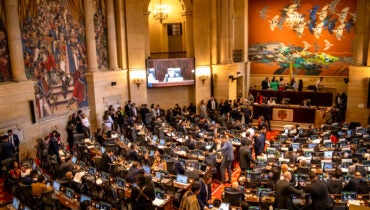America lost a powerful champion for human rights and women’s equality under the law with the passing of Justice Ruth Bader Ginsburg. She helped to level the playing field through groundbreaking decisions to end gender discrimination.
There was a strong bond between Justice Ginsburg and Georgetown University. Her late husband, Marty, served on the faculty of the Law Center as a distinguished professor of tax law. Georgetown law professors, Mary Hartnett and Wendy Williams, are her authorized biographers. Justice Ginsburg made several visits to the Law Center and to the Hilltop to discuss legal issues over the course of her tenure on the bench. When she appeared in Gaston Hall in 2017, she was greeted with thunderous applause by the students.
The “notorious RBG” was an inspirational cultural icon who touched the lives of so many members of the Georgetown community – myself included.
I was working in the White House when President Clinton (SFS ’68) nominated RBG, only the second woman to be appointed to the highest court. She would go on to be confirmed by the Senate by a 96-3 vote. I will never forget how hard Marty worked on Ruth’s behalf, calling everyone he knew to get President Clinton to consider his wife for the position. Justice Ginsburg later laughingly referred to Marty as her self-appointed “campaign manager.”
Justice Ginsburg cared deeply about people and their struggles. She fought for equality for everyone—men and women. Before serving on the US Court of Appeals and later as Supreme Court Justice, she was the founding director of the ACLU Women’s Rights Project, and argued several significant cases before the highest court involving sex discrimination against men, which she hoped would show the male justices that discrimination hurts everyone. For example, in one oral argument she represented the husband of a female Air Force officer who was denied the housing and medical benefits that female spouses of male officers received automatically. As she recalled, “I knew that I was speaking to men who didn’t think there was any such thing as gender-based discrimination and my job was to tell them it really exists.”
It was a time when gender-based discrimination affected most aspects of life: credit, education, mortgages, employment, and more. The law focused on treating women differently, not equally. In those early years arguing before the Supreme Court, RBG began on a steady march that would lead to breakthroughs for women’s equality.
Justice Ginsburg was known for her dissents. She once noted that “dissents speak to a future age… the greatest dissents do become a dominant view. So that’s the dissenter’s hope: that they are writing not for today but for tomorrow.” And that is what happened when Congress passed the Lilly Ledbetter Fair Pay Act which overturned the Supreme Court decision that had upheld the application of a 180-day limit to appeal acts of pay discrimination. Justice Ginsburg wrote a powerful dissent she felt so strongly about that she read it from the bench. She pointed out in her dissent that the ball was now in Congress’ court to correct the error to which her colleagues had fallen. “The court,” she wrote, “does not comprehend….the insidious way that women can be victims to discrimination.” The first bill that President Obama signed into law was the Lilly Ledbetter Fair Pay Act that upheld Justice Ginsburg’s interpretation of the law in the dissent that she had filed.
In 2009, I was invited to deliver the annual Ruth Bader Ginsburg Distinguished Lecture on Women and the Law by the New York City Bar Association. It remains one of the most treasured moments for me. I said that night, in the presence of the Justice, that women in the US have the opportunity and responsibility to not only raise our own voices against inequality and injustice—as Justice Ginsburg had done—but also to help raise up the voices of others so they can raise theirs. Contributing to the advancement of women’s rights and the rule of law frees those voices. I framed my remarks in the context of the UN Fourth World Conference on Women that took place in Beijing 25 years ago this month and the simple yet radical words of then First Lady Hillary Rodham Clinton that still echo around the world: “Human rights are women’s rights and women’s rights are human rights.” This should be simple and not at all radical, but regrettably, women’s rights are still a challenge in too many parts of the world.
Justice Ginsburg was asked what she would like to be remembered for and she said, “I would like to be thought of as a person who cares about people and does the best she can with the talents she has to make a contribution to a better world.” May we follow the example she has left us.
Ambassador Melanne Verveer is the Executive Director of the Georgetown Institute for Women, Peace and Security.


